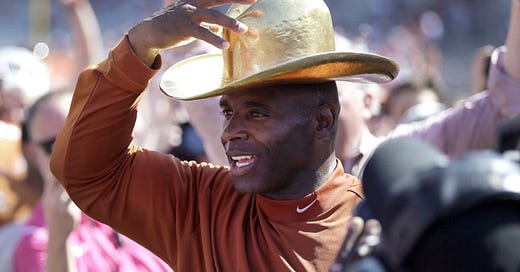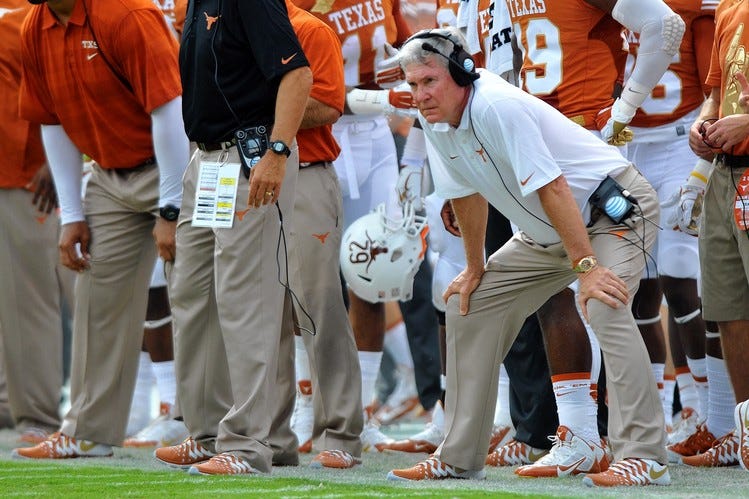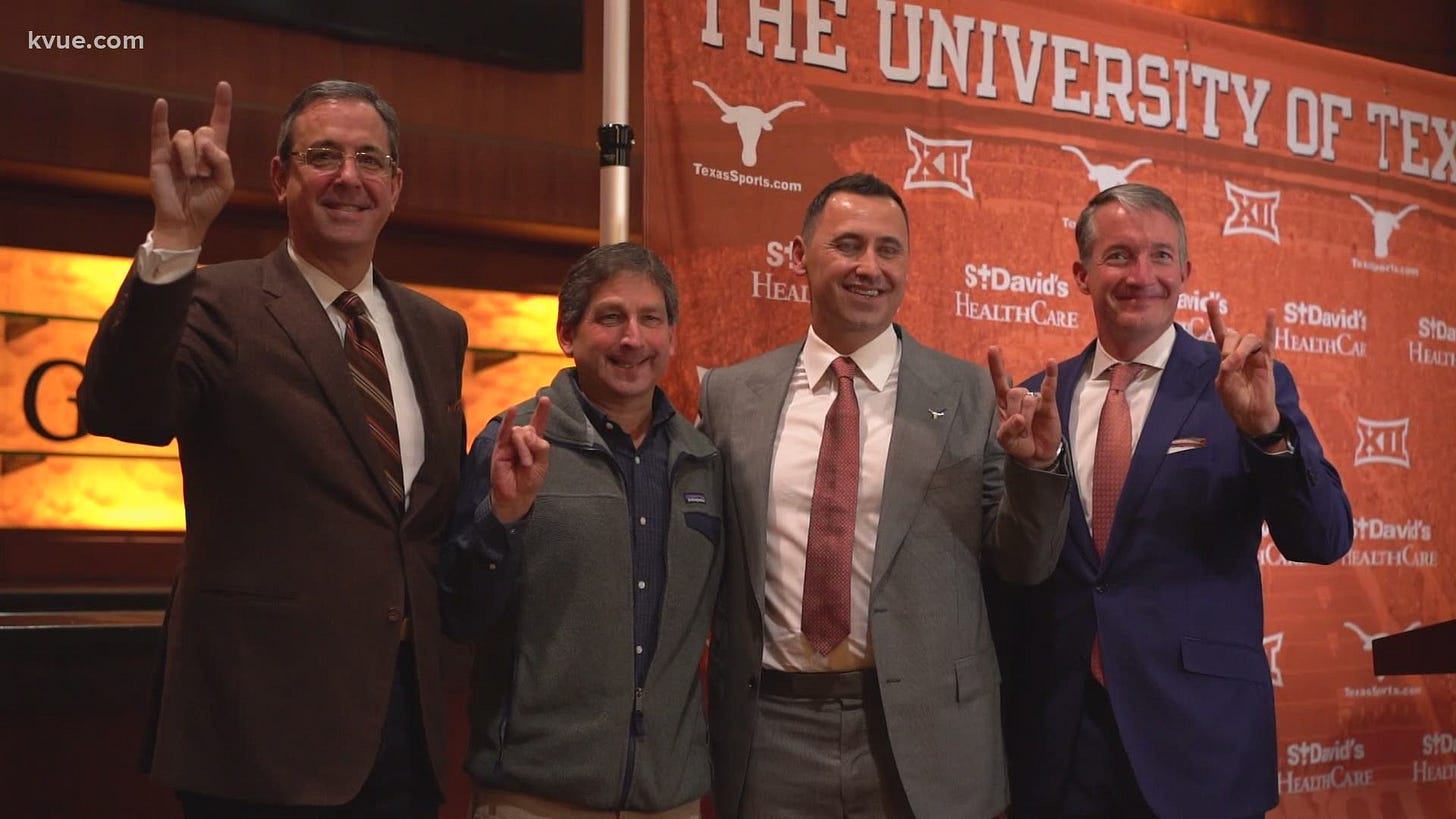It’s human nature to make violent course corrections to our previous decisions, especially when those choices haven’t worked out well. I know people who do this with relationships, where the next lover is always a market correction from the previous partner, like replacing Fiesta Frank who is life of the party, yet won’t find a stable job, with Corporate Carl who is the beacon of financial stability, but refuses to spend time outside of the office. The corrections continue and the lonely souls never win because they won’t take the time to address their own needs and actually ask themselves what attributes they’re looking for in a companion. This flawed process constantly plays out when hiring football coaches and Texas Football has been an expert at it. The rate of success in rebound relationships will be as low in college football as it is on the dating front. Instead of looking to amend past sins, athletic departments should look at their own reflections and hire based on what will work for the school and its program.
When Texas was at its peak in the 2000’s, Mack Brown was thriving in a CEO role. An executive whom I respect once said that being CEO was the first job he had ever had where nobody told him what to focus on. The executive had to prioritize his duties based on need and he viewed himself as a waiter balancing plates, a dish was always going to drop to the ground and shatter and he just had to decide which one that was. Being the coach for a major university like Texas comes with its fair share of juggling, and for a time Mack Brown was D’Angelo Vickers. He made great staff hires, knew when to press the gas on recruiting, glad-handed the bigwigs and put a world-class product on the field. Mack was hands-off and ran a results-based organization and when the results were good, he rewarded his people for it. But when things went south following the 2009 Rose Bowl and all the plates shattered, he couldn’t pick up the pieces. Afterwards, his focus always seemed to be in the wrong place, like when he tinkered with the offense away from Garrett Gilbert’s strengths to one more like Alabama’s. The reason Texas lost to the Crimson Tide was not because of offensive scheme and Brown needed to spend his time on developing Gilbert and his stout 2010 recruiting class. Mack bunkered in closer to his political allies while his program lost its culture, one of swagger and toughness that defined the Young and McCoy years. In short, Brown lost his touch and the Texas faithful were left with a program that seemed out of control on the field and off of it.
When the Coup D’Saban failed, the Texas brass had a bitter taste in their mouths from the end of Brown’s tenure and sought to correct Brown’s problems instead of making the right hire for the program. I graduated in 2012, so the last two years of Texas Football I witnessed weren’t particularly pretty, save Justin Tucker’s kick against the Aggies. In the fall of 2011, I was by Moncrief walking to class (after illegally parking somewhere on campus) and saw a football player I knew sprinting through the parking lot with no shoes on while holding his shoulder pads. I realized he was late to practice and I turned to see where he was going, expecting to see him take off towards the practice bubble at the corner of Red River and Dean Keaton. In fact, his run was a short one and I realized he was just running not miss the charter bus that was driving him the short distance to the bubble less than half a mile away. I remember laughing to myself that this starting linebacker, now friend of Oprah and bestselling author was desperate not to miss a charter bus when walking was probably faster, but this idea of taking a charter bus to practice defined the softness that fans and media believe eroded the Mack Brown Longhorns. Enter, Charlie Strong.
Nowadays, Charlie Strong is that friend who really annoys you, but you think he means well so you feel bad talking behind his back, and to soften the criticism aimed their way you begin every complaint with “I love Charlie, BUT.”1 Strong’s three years at the helm were the worst in Texas history, but before the loss to Kansas, before multiple shutout losses to state schools and before the utter mess the program was left in, Strong was seen as a Mary Poppins come to straighten out the unruly Mack leftovers. At the time, the hire was sold to the masses as a necessary move to instill a blue-collar, everyman feeling to the Longhorns. Strong’s teams would be tough and classy, contrasted with the prima donna Brown teams. As Strong Robespierre’d the bad apples in Brown’s bunch, it was applauded as the pruning of wilt inside Moncrief. Roger Goodell came to meet with Strong over his core values, something that Brown’s teams seemed to lack. This line of thinking was flawed, but many Texas fans (including me) ate it up with a burnt orange spoon. In a perfect world, provided there was any universe where Strong was up for the job, he would have been something like Ed Orgeron, someone who lacked oratory prowess, but who was loved by his players, played physical football and was willing to ask for help, admitting what he didn’t know. Brown began focusing on the wrong plates, but Strong didn’t even know how to juggle. He didn’t have the ability to make staff hires who were capable of coaching at a high level, his recruiting process was messy and his organizational skills were nonexistent. In hindsight where all is clear, his hire looks like a spurned lover trying to wash over their ex’s flaws.
Tom Herman was the man with the plan. Once again, he was all the things his predecessor wasn’t. He came from the offensive side of the ball; he’d been a GA under Mack Brown; he rolled out a recruiting plan at UH that had landed the Cougars players like Ed Oliver; and he was invested in the infrastructure of the program. Where Strong was unorganized and easily distracted, Herman would be a visionary and hyper-focused. I watched Herman’s introductory press conference at my parents’ house while there for Thanksgiving and my dad asked how old Herman was. When I responded that he was 41, my dad (a Red Raider) sighed and said “damn, he’s going to be here 30 years.” Where Strong was Texas trying to adopt a workmanlike approach to football, Herman was a return to the “We’re Texas” arrogance that the Longhorns had drifted away from. He was the coaching search’s only candidate and despite a few obvious red flags, nobody condemned the hire. Recruiting and big picture projects got off to blazing hot starts. Modern aspects of college athletics like social media became strengths where they were detriments under Strong. Texas had its man and he was everything that Strong wasn’t.
Then, Herman lost to Maryland and certainty seemed to be cracking, winning was now “hard.” When you look at Herman’s four years at Texas now, instead of being over-qualified, he was over-compensating. The brazenness was just insecurity and the confidence, a façade. The binder wasn’t the genius of a mastermind, it was a roadmap for an uncertainty under pressure. Herman’s tenure was a failure according to the expectations he set: “we will win championships.” However, compared to most college football programs, it was a successful four years and therein lies the greatest frustration with Herman.2 The Longhorns were competitive and could have won nearly every game they played in, but his penchant for control and close games doomed him. During his time at Texas, his program did an impression of a good football team: he recruited well and he won his bowl games, but much of the accomplishments of the Herman era are empty calories. In drawing a comparison to Herman, I think of Elizabeth Holmes, the founder of Theranos, the health technology company that claimed to revolutionize blood tests. Holmes changed her voice and donned Steve Jobs’ black turtleneck. She looked the part and knew aspects of how to be a CEO, but she was a liar. In Herman, Texas had someone who had been around great coaches and could mimic aspects of their traits, but in reality, he was an impersonator.
In attempting to replace Herman, the Longhorn triumvirate of Regent Kevin Eltife, President Jay Hartzell and AD Chris Del Conte looked to end the rebound hiring process and go for their dream spouse in Urban Meyer. It didn’t work out and now the Longhorns are 13 days away from kicking off the Steve Sarkisian era. There were rumors of Brian Kelly, attempts to woo Kyle Shanahan and other rumblings. I know for a fact that CDC wanted someone who would have checked many of the boxes Sark checks, yet wouldn’t have been perceived as a sexy hire by the fanbase. Someone with SEC ties was wanted, for reasons that are very apparent now and there are clear ways in which Sark fits the mold of a market correction to Herman. Herman’s slugfest style of offense was aesthetic torture, whereas Sark’s offense at Alabama was art for football’s Louvre. Where Herman seemed tense, Sark is easygoing. Herman lacked humility, whereas Sark’s comeback from addiction puts his mortality on display for the world to see. It could be the oversteer in the opposite direction all over again.
There are also ways in which the triumvirate’s arrival at Sark deviates from the market correction approach of coaching searches past. I believe the powers-that-be looked at three things a head coach must have to be successful at Texas. First, that person must be able to connect with the fanbase and players. Texas football has been defined by two coaches who got it right and put the “bb’s in the box.” There are a lot of masters you serve when coaching at Texas, but your leash will be longer if you make friends. Before anything else, DKR and Mack Brown made friends. Sark has embraced the tradition and history of Texas football while adapting to the present struggles that athletes face. See his “soapbox” on the mental health pressures that athletes face for an example. Second, the coach must have a firm commitment to a football identity and layer onto it over time. Sark has a strict pro-style passing philosophy focused on attacking, but he has shown the ability to grow and layer it over time with everchanging evolutions like the RPO. Great coaches have a system and will add to it as the game adapts and grows. Last, they must be able to look at themselves in the mirror and change what they don’t like. Great coaches are confident, but they will adapt and make changes about themselves or their program before they’re told to. Sark knows the stakes. He’s lost it all and when he was fired by USC for alcohol abuse, he never envisioned himself back leading a major program. When Texas took the field against Alabama on that cool California night in January of 2010, there were no indications it was a football program hanging on by a thread. With a quick hit to a shoulder, it can all end, exposing everything you were doing wrong. Sark’s own decisions saw him lose his dream job on the national stage. He knows how quickly what you’ve built can collapse. He has looked in the mirror and grown. This time, hopefully Texas has done the same.
Many of my friends who are fans of opposing teams bring up how much they liked Charlie Strong. “He was such a nice guy, I wish you all had kept him.” Yeah, no shit Aggie Archie, I wish you all had kept Fran, he was a stellar guy too.
Herman’s four years don’t get you fired at most programs. Hi, Jim Harbaugh. His firing highlighted his inability to make friends or connect with the fanbase. When Strong lost to Kansas, there were still people who wanted him to stay because they thought he was such a nice guy. Herman was relatively successful, but had no allies and in the end he was at an empty table.








